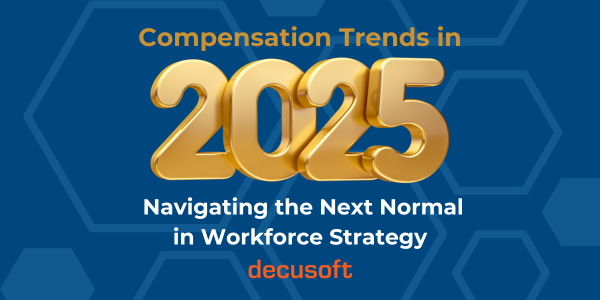Compensation remains one of the top priorities for candidates when choosing a potential employer. This is evidenced in the Great Resignation more than anything – workers are voting with their feet for better pay and benefits.
Over the past two years, compensation and rewards have come under the public spotlight like never before, especially with the introduction of legislation aimed at improving pay transparency and equity.
However, organizations still struggle with establishing a consistent and transparent approach to compensation management.
Rewarding Skills: A New Approach to Hiring
The concept of skills-based pay has been around for some time now, albeit, theoretical for most employers. Companies continue to set compensation based on traditional credentials – education, experience, and job levels. But as the nature of work becomes more complex, traditional approaches to compensation become ineffective.
Skills-based compensation strategies reward candidates and employees for the range, depth, and categories of the skills they offer. Skills-based compensation encourages candidates to attain a wide range of skills that are critical in the new era of work. The ability to work without supervision, high task complexity, teamwork, and greater flexibility are just some of the skills that have come to the forefront over the past two years.
One of the key advantages of this compensation philosophy is that it helps businesses do more with less. Employees who demonstrate range and depth in skills can take on multiple roles and tasks, resulting in lower headcount costs for organizations. It also improves overall business productivity through optimal resource allocation.
Ultimately, a skills-based compensation strategy leads to profitability.
So, despite the many advantages skills-based compensation offers, why are companies still not embracing it?
Skills-based compensation comes with a significant implementation cost – organizations will need to offer higher average wages without realizing instant benefits from the strategy. Organizations will also need to develop a new approach to job analysis, prioritizing skills over tasks. This adds a new layer of complexity for compensation teams as pay administration becomes more challenging and expensive.
Lastly, skills assessment is not a perfect science yet and it is difficult to measure certain skills.
What’s the Solution?
A recent study by Manpower Group reveals that American employers have the strongest hiring outlook (48% growth) in the past 15 years. A whopping 69% of employers have said that they’re finding it difficult to fill roles.
The need for a better hiring strategy is more pronounced than ever. Enter job-fit assessment.
A job-fit is assessed by comparing the requirements and responsibilities of a role with the knowledge, skills, and aptitude of a candidate. Understanding the relationship between skills and the role is the first step to defining a suitable compensation strategy.
To create a good job-fit with regards to compensation, organizations will need to remap jobs to skills, rather than tasks. Here are four factors to consider when determining a compensation strategy based on job-fit:
- Are you hiring an individual contributor or a manager: Different roles call for different skills. While managers demand higher salaries at most organizations, the skills-based compensation model flips this approach on its head – compensation should be proportional to skills instead of the “employee level.” Current trends suggest that most organizations have embraced a flatter hierarchy where business impact supersedes traditional performance metrics.
- Job family pricing: Developing a cost model for similar types of jobs (roles that require similar skills) can help you determine how you should price the skills you want. You can base the data on competitor salaries for similar roles or use internal benchmarking if you already have the required job families.
- Nature of work: Is this going to be a hybrid, remote or on-site role? Some of the companies that pioneered the remote work revolution even before the pandemic, use global or location-based pay exclusively, or a combination of both. For example, Buffer and GitLab pay local salaries using their own proprietary formulas, while Basecamp and Zapier offer a more location-agnostic approach to structuring employee compensation.
In the book titled, Remote Work, author and former Head of Engineering for Stripe, Juan Pablo Buriticá argues that remote and office roles bring a different set of expectations and challenges and that this should be a consideration when it comes to pay:
“I believe compensation should consider responsibilities and effort over location. A remote worker and an office one may have the same job, while requiring them to do different tasks to meet their expectations; and this should be factored into how they’re compensated. This doesn’t mean one mode is worth less than the other. If you require me to commute to an office, I may have higher compensation expectations because it’s additional effort. The same works if you ask me as a remote worker to adapt to HQ’s core hours over my local one. A one-dimensional approach to compensation can disadvantage some workers over others if the efforts are different, and this should be considered to build an equitable workplace.”
- Hot Skills: Skills are valued differently over different periods of time. For instance, web development was a hot skill in the late 90s, today it has lost some of its sheen with WYSIWYG editing tools becoming more common. What are the skills you are ready to pay a premium for?
There’s an intricate relationship between compensation and job-fit as we enter the era of skills-based hiring. Succeeding in this environment will require employers to reconsider how they think about jobs. More importantly, how they will pay for jobs.
A one-size-fits-all approach to compensation will not cut it anymore. Creating tailored compensation packages for skills and job-fit is crucial to succeeding in the current talent market. Solutions like Compose can help your scale compensation personalization and realize better hiring outcomes.




